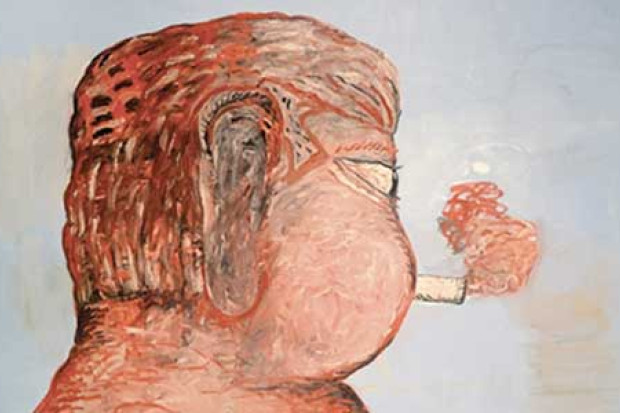A Profile of Angel Climent
In 1961 Angel Climent arrived in Cork from Valencia aged eighteen and without a word of English to try for the post of organist and choirmaster at the Cathedral of St Mary and St Anne. This characteristically impulsive move was prompted, it appears, by a chance conversation in the upper echelons of the church hierarchy when the Bishop of Cork, Cornelius Lucy, happened to mention to the Bishop of Valencia while visiting Spain that his present organist and choirmaster was failing in health and due to retire. Word percolated down, arrangements were made, and Climent duly presented himself in Cork to be interviewed by Aloys Fleischmann snr who had held the post in the Cathedral since 1906. The interview, which had to be conducted through an interpreter, proved to be something of an interrogation. Fleischmann himself was too ill to be little more than a presence and the active part was taken by his formidable wife Tilly, herself an accomplished pianist and a highly respected teacher. His youth notwithstanding, the Fleischmanns must have been reassured by Climent’s responses as he was recommended for the post although he had not yet completed his studies at the Valencia Conservatoire or obtained his diploma.
To have satisfied ‘the Herr’, as Fleischmann snr was known, in a searching interview was no small achievement. To have satisfied Frau Fleischmann herself indicated that this untried and, on paper at least, unqualified young man must have shown some remarkable abilities as well as a thorough grasp of the duties and responsibilities of an organist and choirmaster in a Catholic cathedral with a flourishing musical tradition. And indeed from the age of seven, when he followed his older brother into the choir of Valencia Cathedral, music in general, and the music of the Church in particular, had been the central interest in Angel Climent’s life.
Choral music in Valencia in Climent’s youth was largely in the hands of Vincente Sansaloni, a gifted choirmaster who had trained a body of singers some sixty or seventy strong which not only supplied choral music for specific occasions to churches without choirs of their own, but also functioned as the regular Cathedral choir. In this function the singers were conducted by Eduardo Soler, a canon of the Cathedral, and it was under his guidance that the young Climent became thoroughly familiar with the liturgy of the Catholic Church, with the function of music in the celebration of that liturgy, and with the unparalleled riches of Catholic liturgical music itself. Before the revisions to the liturgy and to the manner of its celebration recommended by the Second Vatican Council, the foundation of this repertoire was of course the great corpus of Gregorian Chant and the polyphony of the sixteenth century, with particular emphasis in Valencia, naturally, on the polyphony of the great Spanish school. For the eleven years that Climent sang in the Cathedral services this was his daily diet, leavened needless to say by other music including that of Soler himself who, in the venerable tradition of the thoroughly trained maestro di capella, was perfectly equipped to provide suitable music whenever the need arose.
The actual training of the singers, however, was the business of Vincente Sansaloni, and from the moment the boys joined his choir this was both intensive and of the utmost thoroughness. Every day they assembled as a class in his house for two hours of solfège or sight-singing. Sitting at a large round table with their books of exercises open in front of them the boys took their turns to sing, conducting the music as they did so. Climent rapidly acquired complete fluency under this regime and music became for him as natural a medium in which to operate as was his native language. And possessed as he was of an exceptionally pure voice as well excellent abilities, he was rapidly promoted to the distinguished position of solo treble.
Thus it was as a considerably experienced twelve year old that Climent enrolled at the Valencia Conservatoire to prepare for his diploma. Here the study of solfège was continued, added to which were the usual studies in counterpoint and harmony where Climent learned to manipulate the compositional techniques of those composers whose works he had been singing since the age of seven. His principal study however was the piano. At the Conservatoire instrumental instruction took the form of group classes. It was for these that the students would prepare their work, and it was expected that they would be ready to perform whenever called upon. The performances would then be discussed and criticised, or indeed simply dismissed if in the view of the professor not enough work had been done. But Leopold Magenti, Climent’s teacher, supplemented these Conservatoire classes with private instruction for students of particular promise. As his object was to foster any real talent the fees he charged were purely nominal and Climent was fortunate enough to benefit from this generous and encouraging interest. Opportunities to put his increasing keyboard abilities to practical use frequently arose when, with the dispatching of groups of Sansaloni’s singers as occasional choirs to the smaller churches, Climent was asked to deputise as organist. Furthermore it was expected that the compositional techniques acquired at the Conservatoire would not remain mere paper skills but would be wedded with keyboard playing, and when on social occasions Magenti summoned one of his students to the piano and gave the instruction to ‘play away!’, he did not mean a recital of carefully prepared repertoire but free improvisation suited to the mood of the occasion.
All these studies were of course suspended in 1961. Climent’s plan was to prepare for his diploma recital in Cork, working on his own, and to present himself in due course as an external student to the examiners at Valencia Conservatoire. In spite of Magenti’s scepticism as to the likely success of such a plan this is exactly what he did, and gained first prize in the competitive diploma examinations in 1963.
In the meantime his career in Cork began to develop. Although his composing had hitherto been confined to preparing the exercises required for the Conservatoire’s composition classes, he now began to write music for his choir in the best maestro di capella tradition. That the able young choirmaster should also be a composer was an additional surprise in Cork and his first piece, an a capella setting of Hodie nobis, had to be sent upon request to the Fleischmanns who were clearly curious about this latest manifestation of ability on the part of ‘the Herr’s’ successor.
His duties in the Cathedral entailed some teaching in St Finbarr’s, the Diocesan Seminary, but he also quickly gained an entreé into the Cork School of Music as a piano teacher when he was asked by Bernard Curtis, the Director of the School, if he would be willing to teach a Spanish-speaking student, a nun who had arrived in Cork from the Philippines and knew no English. This in turn led to his engagement by Radio Éireann whose Cork studios occupied the same building on Union Quay as the School of Music. These were the days of live radio broadcasting and Climent began to feature regularly both as an accompanist on Saturday evening broadcasts and also as a piano recitalist. Unfortunately the only music that anyone seemed to want to hear him perform was Spanish piano music, and he understandably became a little weary of the inevitable requests for Falla, Albeniz and Granados to the virtual exclusion of everything else in his repertoire.
But the future looked bright. The job in the Cathedral was well paid according to the standards of the day, and he was also beginning to acquire a useful reputation outside church music. The only difficulty was that in coming to Cork Climent had missed his compulsory national service in the Spanish army, and this could not be avoided. In Franco’s Spain there was no question of an exemption. A return would simply mean arrest. Besides, there was some pressure from his nationalist family to do his duty by his country. So Climent explained the situation to the Cathedral authorities, and on the understanding that his job would be kept for him he left for Spain and army service in 1964 spending the next two years in North Africa.
When he finished in the army Magenti advised him to go to Paris to finish his pianistic studies, which is what his talented contemporaries had done. But Climent was determined to go back to Cork. He returned however to find that in his absence his post in the Cathedral had been filled. The Cathedral authorities had clearly come to feel that the services of a highly trained professional could be dispensed with without detriment to Cathedral music and Climent’s assistant, an amateur musician, had been appointed in his stead. The effect of this on the tradition so carefully nurtured by Aloys Fleischmann and indeed by his wife’s father before him, and passed into the capable hands of Angel Climent, is not difficult to imagine. It is a sufficient indication of the current interest in music in the Cathedral of St Mary and St Anne to relate how the long lost manuscript of Hodie nobis turned up in the Cork School of Music this summer when miscellaneous material was being sorted and catalogued prior to its removal from the present building. These operations necessitated by the construction of the new School of Music, shortly to commence, brought several interesting things to light including the Cathedral’s entire choral library, and with it Climent’s manuscript, which had been offered to the School some time before as an alternative to its being dispersed and disposed of!
Notwithstanding Bernard Curtis’ discouraging amazement that he bothered to come back to Cork at all, and further incredulity that he intended to stay under the circumstances, Climent immediately set about finding alternative employment. He obtained a post in St Brendan’s Seminary in Killarney which he held for thirteen years, and his renewed involvement with the Cork School of Music gradually increased. Indeed his teaching at the School led to closer ties with Cork when in 1968 he married Myra Comer who had been one of his pupils. By the mid 1970’s, with a young family, he was fully settled and happy to accept a full-time post at the Cork School of Music, having taken Irish nationality some time before.
In 1967, shortly after his return to Cork, Climent was appointed organist at the church of St Francis in Liberty Street, and this prompted him to begin the composition of a series of liturgical works. These are motets for the most part, but they also include the Missa Solemnis and the Mass of the Holy Spirit. All of these works were conceived for practical church use, and the masses were composed to the vernacular text now in use since the Second Vatican Council and, in its spirit, designed to allow the words to be heard with maximum clarity. In these pieces the music is very much at the service of the liturgy, avoiding ostentation and any unnecessary elaboration for its own sake.
One other significant liturgical work in the same vein was composed in 1980 at the request of Cecil Hurwitz, founder of P.E.A.C.E. (Prayer, Enterprise And Christian Effort). Hurwitz had the idea of commissioning Cork composers to write music for an annually celebrated mass for peace and in 1976 he approached Aloys Fleischmann who accepted the commission and suggested that each composer’s setting should be performed each year for three years. The third performance of Fleischmann’s Mass for Peace took place in 1979 and Climent was invited to provide the commissioned setting for 1980. Also originally a Mass for Peace, he later changed the title to Missa in illo tempore.
Climent clearly felt the need to give purely musical considerations a freer rein than was possible in this kind of liturgical composition and in 1978 he completed a Suite for Flute and Piano which was performed that year at University College Cork, and marked the beginning of a growing interest in chamber music. The Jupiter Ensemble commissioned a Piano Quartet in 1984 and this was followed by a String Quartet, completed in 1990 for that year’s A Sense of Cork festival and subsequently performed in London. The latest addition to this group of chamber works is a Sonata for Cello and Piano commissioned by Gerry Kelly, a colleague at the Cork School of Music. Completed in 1997, it was performed later that year by Gerry Kelly and the composer.
Climent’s fluency has always put him in considerable demand as an arranger and this brief discussion of his music takes no account of the hundreds of arrangements he has made for various combinations of voices and instruments. Virtually all of these were composed for specific occasions and with specific performers in mind: arrangements for choir of Irish folk tunes; arrangements for voice and piano; arrangements for two pianos, including a particularly hilarious version of Tea for Two; arrangements for chamber groups. He has lost count. In keeping with his practical sense of music making he regards these as an opportunity to exercise his craft, test his compositional ingenuity, and provide music which is tailored precisely to requirements.
In this context it is not surprising to learn that Climent’s music is unashamedly tonal. Apart from the obvious necessity of writing music within the capacity of his various choirs, he has never felt that non-tonal procedures were necessary for what he had to say. In the more extreme developments of the avant-garde he has no interest whatsoever, and of twentieth century composers he singles out Bartók and Stravinsky as of particular interest to him, especially in their management of rhythm, although their influence is not to be heard at all in his own compositions. The predominant recurring influence in fact, in spite of all his years in Cork, is Spanish folksong and the rhythms of Spanish folk dances and this is conspicuously evident in his most recently completed work, a full-scale Concerto for Cello and Orchestra. He has also recently revised the 1984 Piano Quartet as a Rhapsody for Piano and Orchestra, feeling that the chamber medium did not allow the ideas their full scope. The premières of both of these works are planned to take place in Cork next year.
Apart from preparing orchestral material for these recently completed works Climent has no immediate compositional plans. His recent retirement from the Cork School of Music might be thought to free much valuable time for composing, but his activities as an accompanist, an aspect of his career which frequently takes him abroad, are likely to devour much of it. He has always described himself as a composer ready and willing to respond to the request for a new piece. An external demand acts as a stimulus to his imagination and he will think about his next work, he says, when someone asks him to write it.
The music on the Irish Youth Choir’s recording was composed over a twenty-year period, the earliest piece being Salve Regina written shortly after he arrived in Cork and the latest the Missa in illo tempore. One of its most striking features is the craftsmanship of the choral writing. The music is laid out with maximum effectiveness and the calculation of sonorities is precise, and while there may not be much overt polyphonic writing the meticulous voice-leading shows the hand of a skilled contrapuntist. The style is straightforwardly tonal and the harmonic vocabulary deviates little from common practice procedures, but Climent manipulates this vernacular in a personal way. This music is completely without self-consciousness and one feels that this style and manner of writing, which Climent had absorbed in his youth, is simply the style in which his ideas occur to him and that he thinks no more about it. The organ parts, where the organ is used, are supportive in their role rather than independent, and this strikes one as increasingly disappointing in listening through to the recording as, cumulatively, the textures become somewhat monotonous. On the whole the motets are more successful than the masses where the larger movements are very sectional in construction and no long span of music is achieved. It is only fair however to remember that this is designed as functional music and its effect in a liturgical context is likely to be very different. The motets on the other hand need no special pleading. Here the text, structure and material are in balance, showing Climent’s choral art at its best, particularly in the sombre Lamentations and the finely-judged six-part writing of Caro mea.
This Is My Will, which is produced by Patrick Zuk, shows the Irish Youth Choir in good form. There is a secure well-focused sound and some very expressive singing. Angel Climent himself is the organist on the recording and the choir and soloists (Helen Hassett, soprano; Bridget Knowles, mezzo-soprano; and Robert Craig, tenor) under the direction of Geoffrey Spratt serve him well. That the Irish Youth Choir should, in a recording like this, make accessible little-known repertoire by Irish composers rather than merely add to the existing recordings of standard works is an enterprise that can only be welcomed.
Published on 1 January 2002
Séamas de Barra is a composer and Senior Lecturer at the Cork School of Music.














